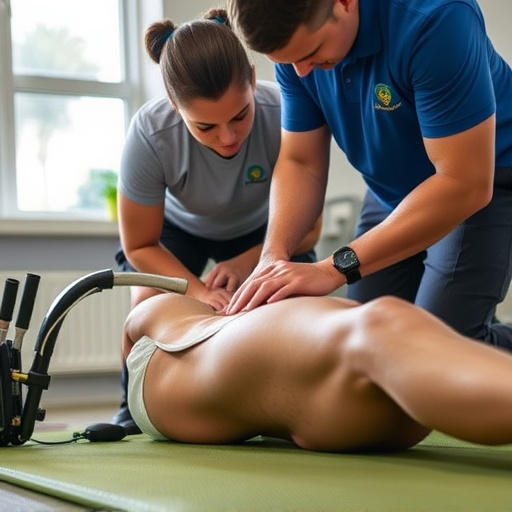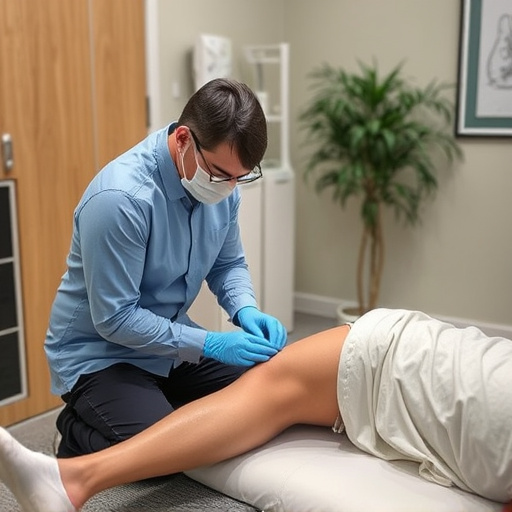Before meeting an accident injury specialist, prepare by gathering comprehensive medical records and documenting symptoms like pain levels, mobility issues, and past imaging reports. Ask specific questions about diagnosis, treatment options (including chiropractic care or rehab), recovery timelines, and alternative approaches to gain clear insights into your musculoskeletal injury care.
Preparing for an accident injury specialist appointment is crucial for ensuring a comprehensive evaluation. Before your visit, gather all medical records and reports related to your injuries. Document your symptoms and experiences in detail, noting any changes over time. Craft a list of questions to ask the specialist—from diagnostic procedures to treatment options. This proactive approach allows you to maximize the appointment’s effectiveness and potentially expedite your recovery process with an accident injury specialist.
- Gather Medical Records and Reports
- Document Injuries and Symptoms Thoroughly
- Prepare Questions for the Specialist
Gather Medical Records and Reports

Before your appointment with an accident injury specialist, it’s crucial to gather all relevant medical records and reports related to your injuries. This includes past diagnostic imaging such as X-rays or MRIs, treatment notes from previous healthcare providers, and any prescription medications you’re currently taking. These documents provide valuable insights into your health history and can help the specialist accurately assess your condition, especially if your injuries are complex or involve multiple systems.
Additionally, make a list of all the symptoms you’ve been experiencing since the accident, including pain levels, mobility issues, and any other relevant details. This information, coupled with your medical records, will enable the accident injury specialist to offer tailored recommendations for treatment, which may include chiropractic adjustments, spinal therapy, or referral to specialized rehab services, ensuring a more efficient road to recovery.
Document Injuries and Symptoms Thoroughly

When preparing for an appointment with an accident injury specialist, one of the most important steps is to document your injuries and symptoms meticulously. This means noting down every ache, pain, or discomfort you experience, as well as any visible marks, bruises, or deformities caused by the accident. Additionally, keep track of any limitations in movement or activities that the incident has affected. This detailed record will serve as a crucial reference for the specialist during your consultation.
By documenting your experiences thoroughly, you provide essential information that helps the accident injury specialist in diagnosing your condition accurately. Moreover, it enables them to create personalized treatment plans tailored to your specific musculoskeletal injuries, ensuring efficient and effective care. This process is particularly vital in cases of complex or severe car accident injury care.
Prepare Questions for the Specialist

Before your appointment with an accident injury specialist, take some time to prepare a list of questions. This proactive approach will help ensure that you gain valuable insights and clear answers regarding your condition. Start by considering your specific concerns; for instance, if you’ve been experiencing persistent pain or have noticed limitations in your daily activities, ask about potential causes and available treatments. Inquire about the specialist’s expertise in areas like physical therapy and functional rehabilitation, as these can play a crucial role in mobility improvement.
Additionally, seek clarification on diagnosis procedures, expected recovery timelines, and any recommendations for further tests or assessments. Don’t hesitate to ask about alternative treatment options and their potential benefits. By preparing these questions, you’ll be better equipped to actively participate in the consultation, leaving with a clearer understanding of your next steps towards healing and recovery.
When preparing for an accident injury specialist appointment, having your medical records and reports ready, documenting injuries and symptoms thoroughly, and crafting thoughtful questions will ensure a productive session. These steps empower you to actively participate in your care and facilitate effective communication with the specialist, ultimately enhancing your path to recovery. Remember, an organized approach can make all the difference when seeking expert guidance from an accident injury specialist.














